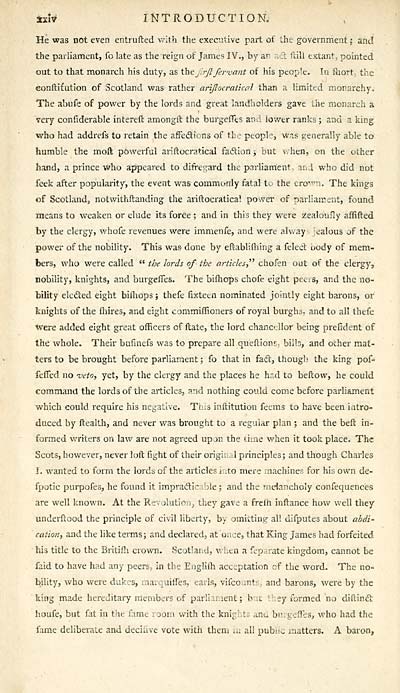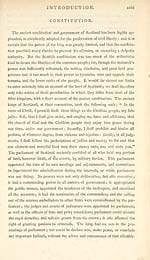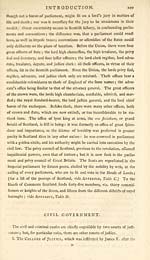Gazetteer of Scotland
(32) Page xxiv
Download files
Complete book:
Individual page:
Thumbnail gallery: Grid view | List view

ixiv INTRODUCTION,
He was not even entrufted with the executive part of the government ; and
the parliament, fo late as the reign of James IV., by ar a& lull extant, pointed
out to that monarch his duty, as the firjl fevuant of his peop'e. In Short, the
eonftitution of Scotland was rather arifiocraticcl than a limited monarchy.
The abufe of power by the lords and great landholders gave the monarch a
very confiderable intereft amongft the burgeffes and iower ranks ; and a king
who had addrefs to retain the affections of the people, Was generally able to
humble the moft powerful ariftocratical faction ; but when, on the other
hand, a prince who appeared to difregard the parliament, and who did not
feek after popularity, the event was commonly fatal to the crown. The kings
of Scotland, notwithstanding the ariftocratical power of parliament, found
means to weaken or elude its force ; and in this they were zealoufly affifted
by the clergy, whofe revenues were immenfe, and were alway \ ealous of the
power of the nobility. This was done by eftablifhing a felect oody of mem-
bers, who were called " the lords of- the articles" chofen out of the clergy,
nobility, knights, and burgeffes. The bifhops chofe eight peers, and the no-
bility elected eight bifhops ; thefe fixteen nominated jointly eight barons, or
knights of the {hires, and eight commiffioners of royal burghs, and to all thefe
were added eight great officers of ftate, the lord chancellor being prefident of
the whole. Their bufinefs was to prepare all queftions ; bills, and other mat-
ters to be brought before parliament ; fo that in fad, though the king pof-
feffed no veto, yet, by the clergy and the places he had to beftow, he could
command the lords of the articles, and nothing could come before parliament
which could require his negative. This inftitution feems to have been intro-
duced by ftealth, and never was brought to a regular plan ; and the beft in-
formed writers on law are not agreed upon the time when it took place. The
Scots, however, never loft fight of their original principles; and though Charles
I. wanted to form the lords of the articles i.:to mere machines for his own de-
fpotic purpofes, he found it impi*acticable ; and the melancholy confequences
are well known. At the Revolution,, they gave a frelh inftance how well they
underftood the principle of civil liberty, by omitting all difputes about abdi-
cation, and the like terms; and declared, at once, that King James had forfeited
his title to the Britifh ciown. Scotland, when a fepairate kingdom, cannot be
faid to have had any peers, in the Englifh acceptation cf the word. The no-
bility, who were dukes, marquiffes, earls, vifcounts, and barons, were by the
king made hereditary members of parliament; but ! aey formed no diftincl
houfe, but fat in the fame room with the knights d.nu burgeffes, who had the
fame deliberate and decisive vote with them in all pubi.^ matters. A baron,
He was not even entrufted with the executive part of the government ; and
the parliament, fo late as the reign of James IV., by ar a& lull extant, pointed
out to that monarch his duty, as the firjl fevuant of his peop'e. In Short, the
eonftitution of Scotland was rather arifiocraticcl than a limited monarchy.
The abufe of power by the lords and great landholders gave the monarch a
very confiderable intereft amongft the burgeffes and iower ranks ; and a king
who had addrefs to retain the affections of the people, Was generally able to
humble the moft powerful ariftocratical faction ; but when, on the other
hand, a prince who appeared to difregard the parliament, and who did not
feek after popularity, the event was commonly fatal to the crown. The kings
of Scotland, notwithstanding the ariftocratical power of parliament, found
means to weaken or elude its force ; and in this they were zealoufly affifted
by the clergy, whofe revenues were immenfe, and were alway \ ealous of the
power of the nobility. This was done by eftablifhing a felect oody of mem-
bers, who were called " the lords of- the articles" chofen out of the clergy,
nobility, knights, and burgeffes. The bifhops chofe eight peers, and the no-
bility elected eight bifhops ; thefe fixteen nominated jointly eight barons, or
knights of the {hires, and eight commiffioners of royal burghs, and to all thefe
were added eight great officers of ftate, the lord chancellor being prefident of
the whole. Their bufinefs was to prepare all queftions ; bills, and other mat-
ters to be brought before parliament ; fo that in fad, though the king pof-
feffed no veto, yet, by the clergy and the places he had to beftow, he could
command the lords of the articles, and nothing could come before parliament
which could require his negative. This inftitution feems to have been intro-
duced by ftealth, and never was brought to a regular plan ; and the beft in-
formed writers on law are not agreed upon the time when it took place. The
Scots, however, never loft fight of their original principles; and though Charles
I. wanted to form the lords of the articles i.:to mere machines for his own de-
fpotic purpofes, he found it impi*acticable ; and the melancholy confequences
are well known. At the Revolution,, they gave a frelh inftance how well they
underftood the principle of civil liberty, by omitting all difputes about abdi-
cation, and the like terms; and declared, at once, that King James had forfeited
his title to the Britifh ciown. Scotland, when a fepairate kingdom, cannot be
faid to have had any peers, in the Englifh acceptation cf the word. The no-
bility, who were dukes, marquiffes, earls, vifcounts, and barons, were by the
king made hereditary members of parliament; but ! aey formed no diftincl
houfe, but fat in the fame room with the knights d.nu burgeffes, who had the
fame deliberate and decisive vote with them in all pubi.^ matters. A baron,
Set display mode to: Large image | Transcription
Images and transcriptions on this page, including medium image downloads, may be used under the Creative Commons Attribution 4.0 International Licence unless otherwise stated. ![]()
| Gazetteers of Scotland, 1803-1901 > Gazetteer of Scotland > (32) Page xxiv |
|---|
| Permanent URL | https://digital.nls.uk/97343812 |
|---|

